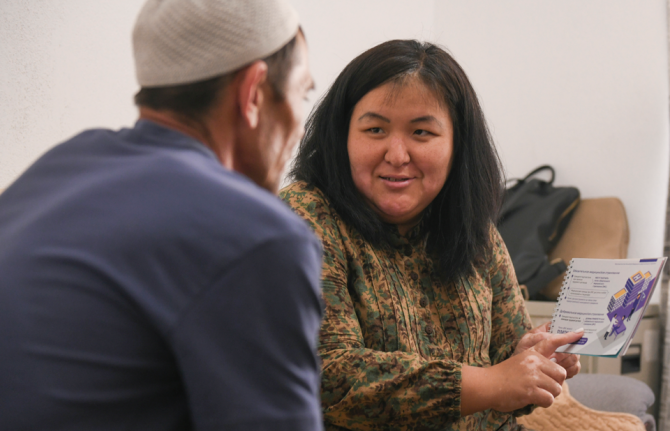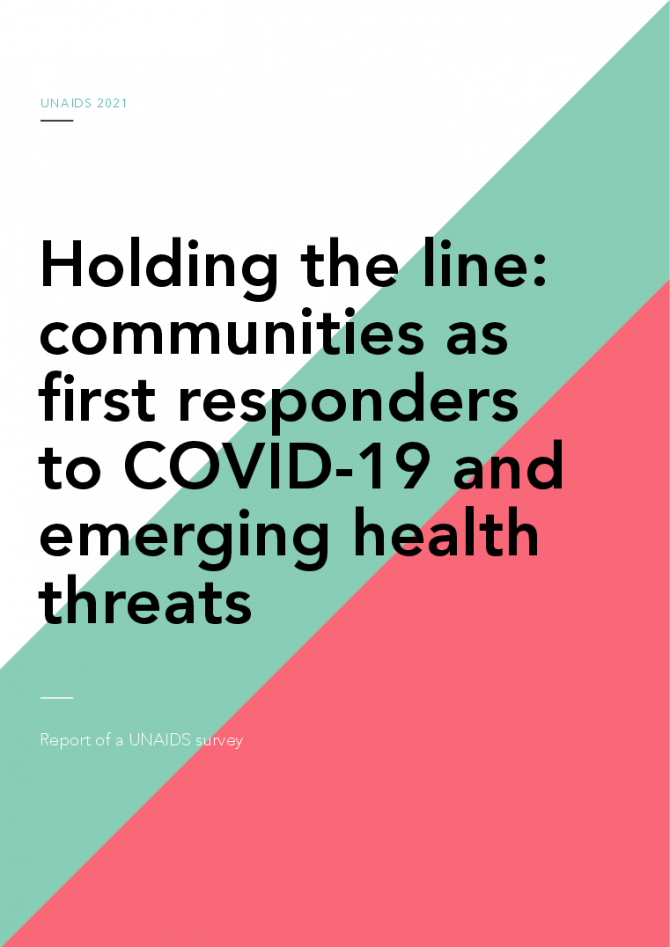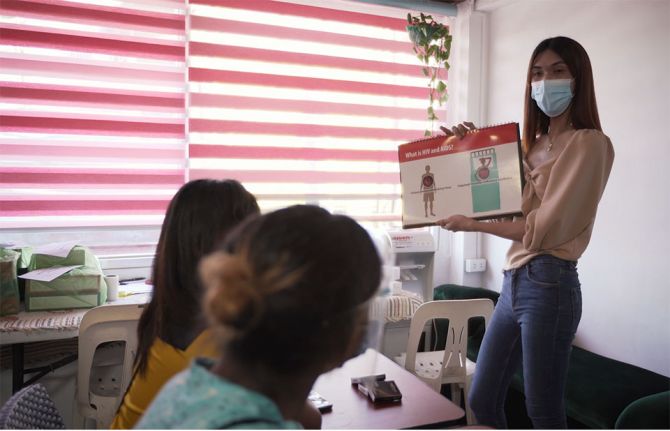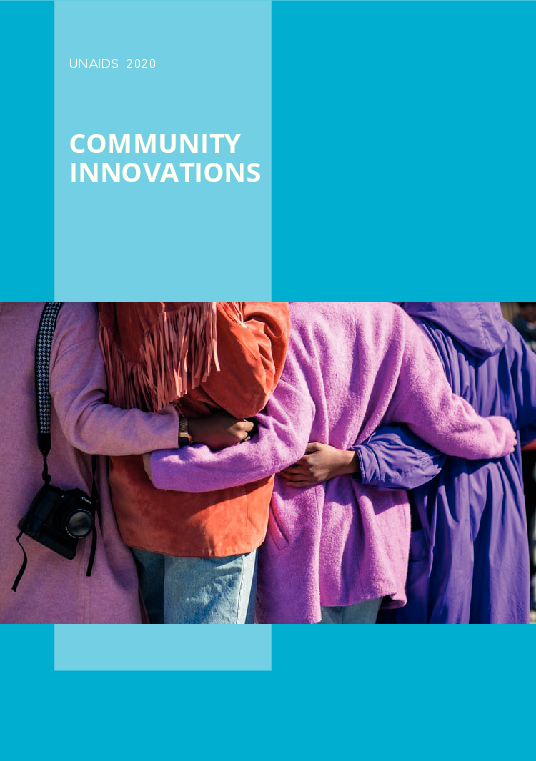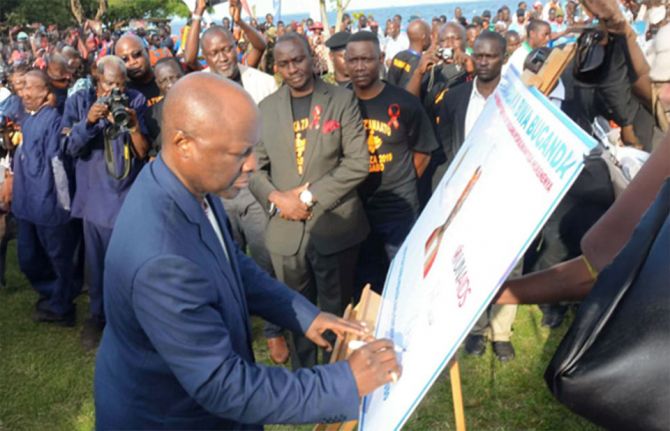
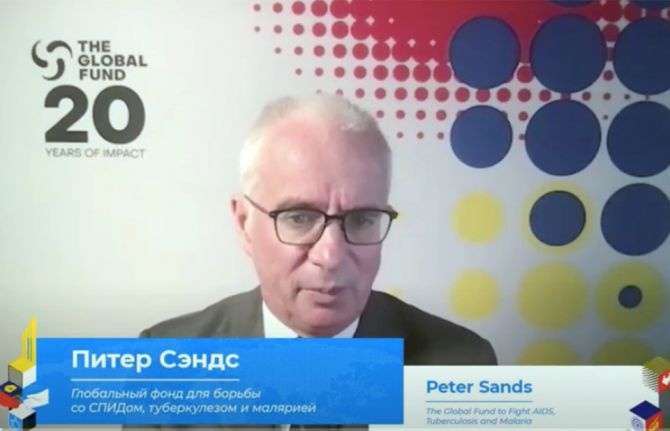
Feature Story
The importance of engagement of community organizations to ensure the sustainability of HIV services in eastern Europe and central Asia
02 February 2022
02 February 2022 02 February 2022Participants from 21 countries in central and eastern Europe and central Asia and the Balkans met in December 2021 in Istanbul, Turkey, for the International Health Sustainability Forum: HIV and COVID-19 in Eastern Europe and Central Asia.
The participants discussed the most efficient means to ensure the sustainability of AIDS programmes and the role of community organizations in providing uninterrupted HIV services during the COVID-19 pandemic in the region.
The results of a three-year project implemented by the Alliance for Public Health in a consortium with 100% Life (formerly the All-Ukrainian Network of People Living with HIV), the Central Asian Association of People Living with HIV and the Eurasian Key Populations Coalition, with the participation of a wide range of partners, were also presented and reviewed. The project was funded by the Global Fund to Fight AIDS, Tuberculosis and Malaria (Global Fund) and was supported by UNAIDS.
Addressing the forum, Peter Sands, the Executive Director of the Global Fund, highlighted the key elements of successful AIDS programmes in the region, among them “systems, not project-based interventions,” the meaningful engagement of communities and their ownership of the HIV response and removing human rights barriers.
“Increasing public funding of HIV services through social contracting mechanisms, which was a rare case a few years ago, has now become an important component of a systemic response to the HIV epidemic in many countries of the region,” said Andriy Klepikov, the Executive Director of the Alliance for Public Health. He noted that over the past three years public funding of HIV services through social contracting mechanisms in the region amounted to more than US$ 30 million. “This is one of the most important achievements of the joint efforts of community organizations and governments in the region.”
However, as the participants noted, to sustain this success an appropriate legal framework, the support of governments and the strengthening of initiatives made by communities are needed.
Several cities across the region have produced impressive results due to the leadership of local governments that have not only taken responsibility for developing and funding municipal AIDS programmes, including services for key populations, but also through the involvement of community organizations in their implementation.
Thus, systematic work by the city government in close cooperation with community organizations saw Odesa, Ukraine, achieve the 90–90–90 targets. “Odesa has managed to change the strategy for HIV testing and treatment. Our experience has already received recognition from the international community. And we are ready to share our best practices and successes,” said Gennadiy Trukhanov, the Mayor of the city.
The experience of the Republic of Moldova was presented by Fadei Nagachevsk, the Vice-Mayor of Chisinau, and Ruslan Poverga, from Initiative Positiva, who demonstrated the importance of close interactions between city governments and community organizations to ensure the accessibility of services for key populations. Mr Poverga also noted that the integration of peer consultants and social workers in public institutions helps to ensure the sustainability of services.
The best practices of municipal responses to the HIV and COVID-19 epidemics of Kyiv, Ukraine, Osh, Kyrgyzstan, Podgorica, Montenegro, Kragujevac, Serbia, Bern, Switzerland, Prague, Czechia, and Istanbul, Turkey, were also presented.
According to Sergiy Dmitriev, an international expert on public health, civil society organizations have also played a leading role in reducing the prices of antiretroviral medicines by monitoring the procurement cycle and budget and attracting generic suppliers. The price of an annual course of first-line antiretroviral therapy has decreased to US$ 131—the average cost of first-line antiretroviral therapy in nine countries in the region was US$ 192 in 2017. Most of the savings on purchases, about US$ 119 million, remained within AIDS programmes.
Another critical area where community organizations have been playing an increasingly important role in the region is community-led monitoring of human rights violations. The results of work on the REAct system (a human rights violation monitoring system) were presented: during 2020 and 2021, more than 6000 cases of human rights violations and cases of stigma and discrimination were registered in seven countries.
Among the most frequent offences in the region are violence by law enforcement officials, denial of access to medical services, disclosure of medical data and stigma in health-care settings, as well as physical violence against women by their partners and relatives. Based on an analysis of all cases, civil society organizations, together with lawyers and governmental partners, developed recommendations for countries that will form the basis for further advocacy.
“Community-led organizations have become leaders in providing people-centred, human rights-based HIV services in the majority of countries in eastern Europe and central Asia,” said Alexander Goliusov, Director, a.i., UNAIDS Regional Support Team for Eastern Europe and Central Asia. “Their meaningful engagement in decision-making processes and financial sustainability provided by government funding are the key for an effective response to HIV and COVID-19 and for future pandemics.”
The forum video is available: in Russian and English
https://www.youtube.com/watch?v=gCVqVUKAJmo
https://www.facebook.com/AlliancePublicHealth/videos/4581620981957116
Region/country
- Eastern Europe and Central Asia
- Albania
- Armenia
- Azerbaijan
- Belarus
- Bosnia and Herzegovina
- Bulgaria
- Croatia
- Cyprus
- Czechia
- Estonia
- Georgia
- Hungary
- Kazakhstan
- Kyrgyzstan
- Latvia
- Lithuania
- Montenegro
- Poland
- Republic of Moldova
- Romania
- Russian Federation
- Serbia
- Slovakia
- Slovenia
- Tajikistan
- North Macedonia
- Türkiye
- Turkmenistan
- Ukraine
- Uzbekistan
Related

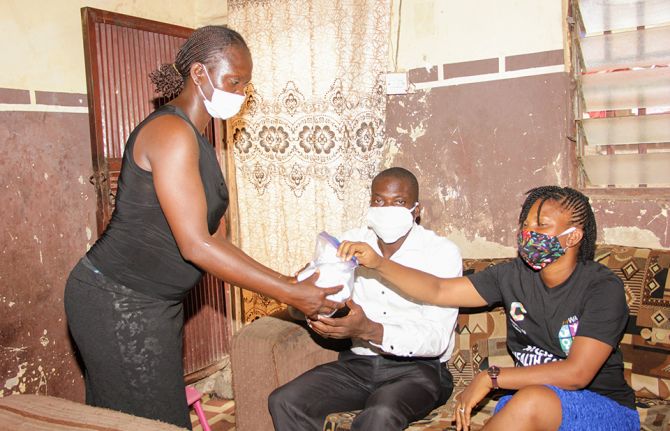
Feature Story
New report highlights vital role of community-led organizations in pandemic response and preparedness
28 January 2022
28 January 2022 28 January 2022In a new UNAIDS report, Holding the line: communities as first responders to COVID-19 and emerging health threats, organizations led by and for people living with HIV and key populations detail their efforts to respond to the colliding pandemics of COVID-19 and HIV. Drawing on qualitative survey data spanning 225 community-led organizations across 72 countries, the report provides a snapshot of the organizations’ work during early 2020 to sustain the HIV response while supporting their communities through the COVID-19 pandemic. The report also illuminates the high-priority actions that are still urgently needed to ensure the continuity of HIV-related services, as well as the sustainability of the community-led organizations providing them.
In community members’ own words, the report tells a story of the phenomenal resourcefulness of community-led organizations to mobilize when and where governments could not. Their stories show that organizations led by and for people living with HIV and key populations, including women and young people, have leveraged in-depth HIV knowledge into broader pandemic expertise. In the face of service interruptions, health commodity shortages, curfews and severe funding gaps, the organizations adapted rapidly to continue providing HIV-related services.
Community-led organizations reported becoming more involved in distributing antiretroviral medicines and self-testing kits, negotiating with government officials to ensure that medicines would be accessible and personally delivering them to beneficiaries. Many organizations also reported shifting their services online, as well as relying on telephone and email contact for personal counselling and monitoring of health status, with some even making home visits in urgent circumstances. Material support, including food packages and income supplements, was mobilized and distributed to those in greatest need.
Organizations also undertook COVID-19-related service provision. They began outreach to community members and the broader public to raise awareness about COVID-19 and share information about how people could protect themselves. They detected and responded to rising levels of gender-based violence, providing assistance and support to survivors. They also distributed masks, soap and hand sanitizer, and constructed handwashing facilities. When the cost and availability of masks and soap became an issue, many community-led organizations reported finding innovative ways to produce these items themselves.
However, the majority of these organizations were distressed that their absence—especially from planning and decision-making processes—was resulting in the failure of national COVID-19 responses to address the needs of their communities. They repeatedly expressed deep concern about the economic impact of lockdowns and travel restrictions on their beneficiaries. They also highlighted continuing difficulties in obtaining personal protective equipment and travel approval, public transport or private vehicles for their staff.
Organizations reported shouldering extremely heavy burdens with little external support. Intense funding gaps left staff in these organizations exhausted and working nights and weekends to fundraise, usually unsuccessfully, with some even turning to their own personal salaries and savings to help their communities.
Community-led organizations are at the heart of a people-centered, human rights-based public health response. UNAIDS has repeatedly called for support and funding for community-led infrastructure, emphasizing that communities urgently need the space and the resources to lead.
“Community-led organizations have guided us through two pandemics, first the AIDS pandemic and now COVID-19,” said Winnie Byanyima, Executive Director of UNAIDS. “Their central and critical role in providing services at the heart of communities, reaching the most vulnerable, must be recognized and valued. Collectively, we must do more to support them financially, engage them meaningfully in decision-making processes and ensure they have all the resources they need to continue their work in responding to HIV and COVID-19 and for future pandemics.”
Where public health systems have engaged community-led networks and organizations and empowered those most affected by pandemics, they have been more successful at countering disinformation, ensuring the continuity of health services and protecting the rights and livelihoods of the most vulnerable. This is what it means to put people at the centre of pandemic responses.
In order to ensure the sustainability of a community-led HIV response, the report calls for five measures to be adopted as a matter of urgency:
- Community-led organizations must be fully included and integrated into national pandemic responses, including the continuing COVID-19 responses. This cannot be limited to consultation and should take place at the level of policy development, planning, design and evaluation of interventions.
- Short-term emergency funding must be mobilized and made readily available to community-led organizations.
- A stable, long-term funding base must be established to enable community-led organizations to function effectively.
- The information base on the work of community-led organizations must be expanded and deepened through systematic documentation, identification of good practices and information-sharing.
- Continuity of HIV-related services must be guaranteed, including through expanding funding to community-led organizations and establishing collaborative arrangements between community-led organizations and medical facilities to ensure sustainability of the HIV response through COVID-19 and future pandemics.

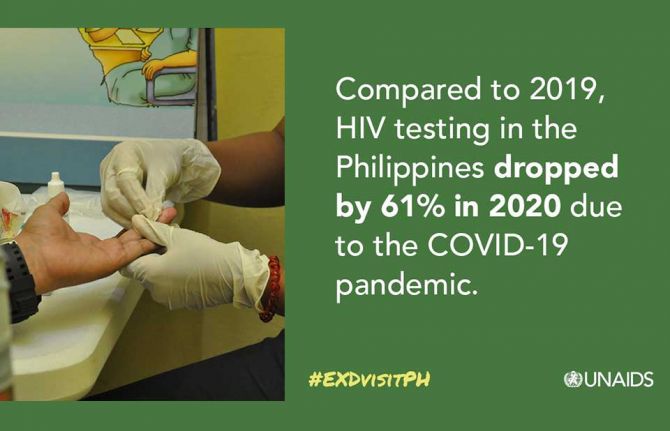
Feature Story
Community-led HIV services stepped up in the Philippines during the COVID-19 pandemic
11 May 2021
11 May 2021 11 May 2021The HIV response in the Philippines has been hit by the COVID-19 pandemic, especially access to HIV prevention and treatment services. According to the Global Fund to Fight AIDS, Tuberculosis and Malaria, in Metro Manila coverage of HIV prevention services for gay men and other men who have sex with men has decreased by 74% since 2019. Government figures show that compared to 2019, in 2020 HIV testing decreased by 61% and enrolment in HIV care reduced by 28%. The COVID-19 pandemic has drawn attention to socioeconomic divides, highlighting failures within the health system to adequately deal with not one pandemic but two.
Despite this, what has been clear from the onset of the COVID-19 outbreak is that civil society and communities have stepped up to the challenge to provide HIV services while navigating through restrictions on movement and lockdowns. One example is the Family Planning Organization of the Philippines (FPOP), a civil society health service provider and advocate of sexual and reproductive health and rights with a network of more than 1000 community-based services across the country. One of those service providers is the Rajah Community Center, a primary HIV clinic located in Iloilo City in the Western Visayas region of the Philippines, which provides HIV services for key populations, including young key populations, in a friendly and stigma-free environment.
“When I tested positive for HIV, I knew nothing about it. I did not know how to protect myself from it and talking about sex was taboo in my house. My friends and I were clueless about condoms,” said Jhenard Jude, a young person from Iloilo City. After receiving his positive diagnosis, Mr Jude learned about the Rajah Community Center. “I heard from my friends that Rajah provides youth-friendly services. I was worried about how others would look at me because of my status, but the staff at the clinic were non-judgemental and very friendly. I was given a care worker who supported me every step of the way to access antiretroviral therapy,” he said.
“This is home to me. I got my HIV self-test kit here in June 2020. Rajah is safe and convenient,” said Lloyd Legario, a young person who regularly visits the clinic for HIV testing and prevention services.
Winnie Byanyima, the UNAIDS Executive Director, has been learning about the Rajah Community Center during a two-day virtual mission to the Philippines to engage with communities, civil society and the government about the country’s response to HIV and COVID-19. During her virtual visit, Ms Byanyima was given a pre-recorded tour of the community clinic and had an open dialogue with Mona Liza S. Diones, the Chapter Program Manager of FPOP Iloilo, Robert Figuracion, the Rajah Community Center Clinic Officer, and three clinic clients from key populations.
“I had the pleasure to speak with some very courageous people who were very open about their experiences at the Rajah Community Center. I extend my deepest gratitude and solidarity to community-based organizations and frontline workers for stepping up and providing essential services during COVID-19,” said Ms Byanyima.
To ensure the continuity of HIV services during COVID-19, FPOP Iloilo worked closely with the Philippines Department of Health, local government units and other treatment hubs and support groups to serve key populations and people living with HIV. Blended services that included online counselling and onsite services covered prevention commodities, testing services, treatment and medical care. This also included providing psychosocial services, which have seen a sharp rise in demand since the first COVID-19 outbreak. Telemedicine and mobile clinics became new channels for differentiated care. Innovative programmes to deliver antiretroviral therapy to clients were established and pre-exposure prophylaxis (PrEP) and condoms were frontloaded to community champions for distribution.
During the virtual visit, Ms Byanyama also learned about the HIV & AIDS Support House (HASH), another renowned community-led service provider, which in coordination with the Department of Health has worked to prevent disruption to HIV services during COVID-19. HASH offers community-based screening, PrEP, HIV referral services, medical assistance to children living with HIV and psychosocial support to key populations. “Civil society organizations were quick to respond to the situation by coming out with innovative courses of action, such as online counselling, alternative modes of antiretroviral therapy delivery and mobilization of volunteers and partners to assist those who were affected by the COVID-19 pandemic,” said Desi Drew Ching, the President of HASH.
“To sustain community-led services, government and development partners have to optimize collaborative partnerships with civil society. This will strengthen their leadership capacities and enhance civic space funding through social contracting programmes,” said Louie Ocampo, the UNAIDS Country Director for the Philippines.
Documents
Community innovations
13 March 2020
This publication is intended to spark interest, inquiry and discussion around community innovations. It draws on the response to the AIDS epidemic—a prime example of disruptive community innovations, not only in the health sector, but with far reaching implications for nearly every aspect of people’s lives—to show that innovation is about enabling communities to have the space, freedom and support to initiate and make changes for themselves. Providing snapshots of innovations across a range of HIV-related themes and geographical areas, this booklet illustrates community innovations through 10 stories on a range of topics, including HIV treatment, mental health issues, tuberculosis (TB) care, service quality, and advocacy to decriminalize consensual same-sex sexual acts. The examples presented here demonstrate both the evolving nature of the challenges faced by an effective HIV response and the ingenuity of the communities that devise ways to overcome them.

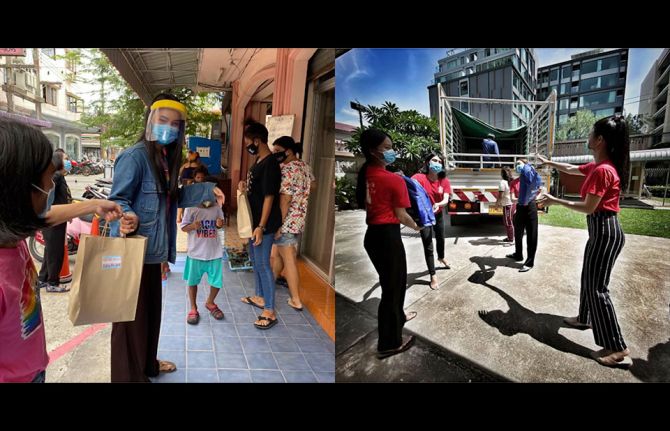
Feature Story
Transgender communities in Asia and the Pacific respond to COVID-19 through activism
30 March 2021
30 March 2021 30 March 2021The global health emergency caused by the COVID-19 pandemic has brought existing inequalities to the forefront, has exposed transgender and gender-diverse communities to a heightened risk of social exclusion, stigma and discrimination, has reduced access to health care and has caused financial insecurity.
“COVID-19 has created an existential threat to many transgender people in Asia and the Pacific. But trans-led organizations and groups have found creative ways to assist their communities, to offer support against social isolation and to support trans and gender-diverse people, especially those unable to work due to COVID-19. We recognize the importance of trans leadership and their response to communities greatly affected by the pandemic,” said Joe Wong, Executive Director of the Asia Pacific Transgender Network (APTN).
When COVID-19 reached India, Maya, a young transgender woman living with HIV volunteering at Basera Samajik Sansthan, a transgender-led community-based organization in Uttar Pradesh, was living in rented accommodation after being rejected by her family. “During the COVID-19 outbreak, my friends and I had to leave our homes because we couldn’t afford the rent,” she said. Basera Samjik Sansthan provided her and her friends with shared accommodation and supplied them with food and medicine. The community-led organization also established a peer support programme to help homeless transgender young people and provide them with hand sanitizer, masks and access to free HIV and COVID-19 testing.
Her testimony is part of a collection of stories published in Dignity amidst COVID-19: Trans Youth Leading The Response, developed by APTN and Youth LEAD, and supported by the UNAIDS Regional Support Team for Asia and the Pacific, to bring visibility to the voices and experiences of transgender and gender-diverse youth leaders and showcase the efforts of transgender-led organizations throughout the region during COVID-19.
“Many transgender people living with HIV were not able to afford transportation to medical centres to receive treatment during the COVID-19 outbreak,” said Della, a young transgender woman living with HIV from Indonesia who works for the Srikandi Sejati Foundation, whose testimony is also collected in the Dignity amidst COVID-19 series. The Srikandi Sejati Foundation established a community support programme that covered transport costs to medical centres to ensure that transgender people could access HIV services. It also implemented local workshops to support and empower transgender women in five districts in Jakarta with knowledge on COVID-19, HIV, mental health and adherence to antiretroviral therapy.
In Thailand, measures taken to curb the spread of COVID-19 and the consequent decline in tourism have forced many entertainment shows and venues to close, leaving many transgender people out of work. “The decline in tourism has heavily affected not only businesses but sources of income for transgender people. Many trans women have returned to rural areas to be with their families due to loss of employment,” said Garfield, a young transgender woman working for the Sisters Foundation, a transgender-led organization in Pattaya that provides a range of HIV services to transgender people, including check-ups for general health, HIV and sexually transmitted infections, hormone therapy and harm reduction. As described in the collection of stories, since the beginning of the pandemic, Garfield and other volunteers have been at the forefront of the COVID-19 relief efforts, distributing food supplies and hygiene products to transgender women.
Basera Samajik Sansthan, the Srikandi Sejati Foundation and the Sisters Foundation are all beneficiaries of the COVID-19 Community Support Fund established by APTN to support transgender people and community-based organizations to ease the burden of the COVID-19 pandemic in the region. APTN provided grants to 22 transgender-led and transgender-inclusive community groups and organizations across 14 countries, enabling them to assist more than 2300 people across Asia and the Pacific. The grant supported various initiatives, including access to essential supplies, food and personal protective equipment, social and mental health relief support, financial assistance and funding support to sustain organizations.
The community-led initiatives and outcomes of the response to COVID-19 are summarized in the Trans Resilience Report—Stories of Hope, Pain, and Survival from the Trans Movement during the COVID-19 Pandemic, developed with financial support from the UNAIDS Regional Support Team for Asia and the Pacific, and in APTN’s multi-week social media campaign.
“On International Transgender Day of Visibility, UNAIDS recognizes the indispensable contributions made by transgender communities in the HIV and COVID-19 response. The leadership and resilience of transgender and gender-diverse communities continues to be an inspiration for our region,” said Eamonn Murphy, Director of the UNAIDS Regional Support Team for Asia and the Pacific. UNAIDS will continue to work with APTN and transgender-led organizations to work towards a region where transgender people and gender-diverse people can thrive as equals.
Our work
Region/country
- Asia and Pacific
- Australia
- Bangladesh
- Bhutan
- Brunei Darussalam
- Cambodia
- China
- Democratic People's Republic of Korea
- Federated States of Micronesia
- Fiji
- India
- Indonesia
- Islamic Republic of Iran
- Japan
- Kiribati
- Lao People's Democratic Republic
- Malaysia
- Maldives
- Marshall Islands
- Mongolia
- Myanmar
- Nauru
- Nepal
- New Zealand
- Pakistan
- Palau
- Papua New Guinea
- Philippines
- Republic of Korea
- Singapore
- Solomon Islands
- Sri Lanka
- Thailand
- Timor-Leste
- Tonga
- Tuvalu
- Vanuatu
- Viet Nam
- Samoa

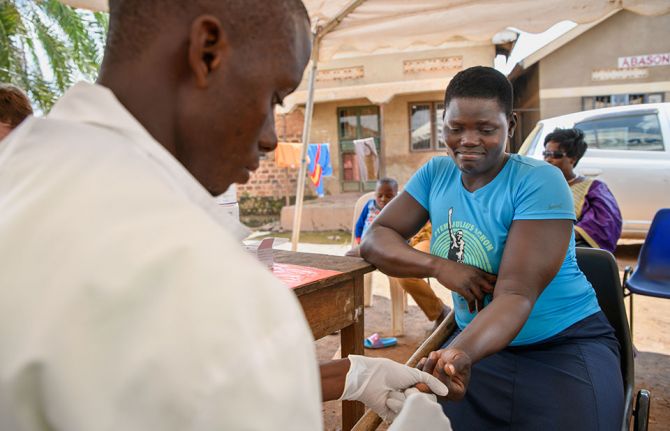
Feature Story
Positive Women with Disabilities in Uganda puts people at the centre during COVID-19 pandemic
29 March 2021
29 March 2021 29 March 2021The World Health Organization estimates that, globally, more than 1 billion people (15% of the world’s population) have a disability. Disability is increasing in prevalence due to ageing populations, trauma, accidents and chronic health conditions, including HIV, tuberculosis (TB) and COVID-19.
Persistent discrimination against and exclusion of people with disabilities, in particular women and girls with disabilities, increases their vulnerability, including their risk of HIV infection. People with disabilities, in particular women and girls with disabilities, also experience barriers to accessing HIV services and are left behind in HIV policy-planning, programme development, service delivery and data collection.
People with disabilities face stigma and discrimination in families and communities, lack transport to health-care facilities and are faced with poor attitudes of health workers while seeking health care.
Since 2004, the AIDS Service Organization (TASO), based in the Mulago Hospital Complex in Kampala, Uganda, has attempted to reach out to people with disabilities. However, it has had limited success due to the complexities of community-based care.
In 2016, in response to these challenges, Positive Women with Disabilities (POWODU) was formed out of TASO to pay special attention to people with disabilities living with HIV in order to reduce AIDS- and TB-related deaths, stigma and discrimination and to promote sexual and reproductive health and rights.
POWODU is headed by Betty Kwagala, a formidable advocate, trainer and woman living with HIV who has 25 years’ experience serving as a counsellor at TASO Mulago. Ms Kwagala is a respected and well-known figure in the community, who has uplifted the lives of many people living with HIV in Uganda.
POWODU, in partnership with TASO Mulago, reaches out to people with disabilities in the urban districts of Kampala, Wakiso and Mukono. According to TASO’s client register, there are more than 13 000 people with disabilities in Kampala and Wakiso enrolled into HIV care. Seventy per cent are women and the majority are homeless.
HIV testing and TB screening are integrated into every POWODU community outreach. “The services are always offered near to where people with disabilities reside because of mobility and transport challenges,” says Ms Kwagala.
If a client tests positive for HIV, POWODU offers immediate initiation of HIV treatment, as per the Ministry of Health guidelines. If a sputum TB test is positive, POWODU will refer the case to the main laboratory for further investigation and proper management. POWODU will then follow up, and, with the support of a TB focal person, arrange pick up for the client in a TASO van to escort him or her to receive the appropriate health service.
Other services offered on site by POWODU include sensitization on adherence to both HIV and TB treatment, prevention of HIV, TB and COVID-19 and accurate information on sexual and reproductive health and rights among people with disabilities.
“The COVID-19 pandemic has led to clients who have been lost to follow-up because they are homeless or reside in informal settlements. The lockdown caused more challenges, such as lack of food and a significant disruption to the usual activities that give them some income, such as begging,” says Ms Kwagala.
During the COVID-19 lockdown, UNAIDS supported 200 people with disabilities living with HIV with food rations, personal protective equipment and personal hygiene kits. It also supported a project to equip 40 people with disabilities with skills on how to identify income-generating activities. They were provided with popcorn-making machines and groundnut grinders.
TASO members were provided with megaphones and sensitized members of their communities on HIV, TB, COVID-19, sexual and reproductive health and gender-based violence.
“POWUDU and TASO have shown remarkable resilience by putting people at the centre during the COVID-19 pandemic by ensuring that people with disabilities living with HIV are safe and not left behind,” says Jotham Mubangizi, UNAIDS Country Director, a.i., for Uganda.
Our work
Region/country
Related

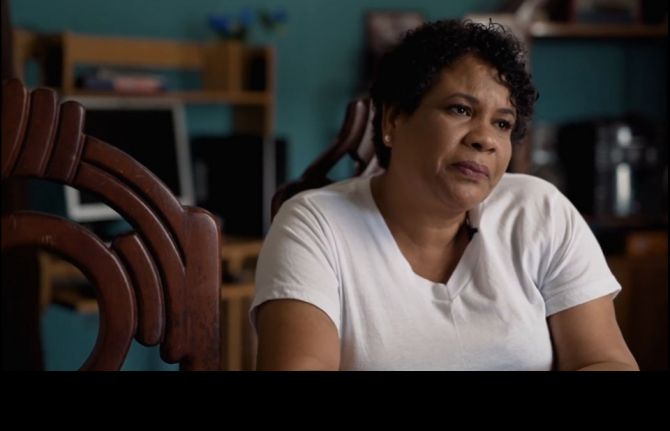
Feature Story
From HIV survivor to COVID-19 responder
03 March 2021
03 March 2021 03 March 2021Ingrid Bretón learned that she was living with HIV when she was 19 years old. It was 1994 and HIV treatment was not yet available in the Dominican Republic.
“I lasted almost five years alive, but dead inside,” she remembers. “I went through every denial process that a newly diagnosed person goes through. Health centres did not want to assist me. I lived every kind of stigma and discrimination.”
In her town, La Romana, she was known as “the AIDS girl”. It was impossible to find work.
HIV treatment helped changed the trajectory of her life. With the guidance of her doctor, José Román, she became the first woman living with HIV in La Romana known to have given birth to an HIV-free baby. As she continued treatment it occurred to her that she was perfectly healthy and could live a more meaningful life.
“I thought to myself, “I am not getting sick, my hair is not falling off, I do not have sores, I do not have AIDS. I want to do things,”” Ms Bretón remembers.
In 2002 she formed the Paloma Group Foundation (La Fundación Grupo Paloma), which provides psychosocial support, legal assistance and job opportunities for people living with and affected by HIV in the eastern region of the country. The organization also plays a key advocacy role, bringing visibility to issues such as treatment adherence, prevention and stigma and discrimination.
One of the foundation’s innovations is an agriculture project that employs people living with HIV.
“It’s a beautiful process,” Ms Bretón says while walking through the sunny, red earth fields, past tomatoes, papayas and bananas. “The idea is that people living with HIV are able to move forward, working and providing for their families.”
The families with whom the Paloma Group Foundation works have been directly affected by the COVID-19 pandemic. The work of the foundation has been critical during this time. Its volunteers do home deliveries of food, medicine and clothing. The foundation is a source of connection and emotional support at a time when communities living with HIV are more isolated than ever due to social distancing measures.
The first Rapid Survey on the Needs of People Living with HIV in the Dominican Republic in the context of COVID-19 found that while 92% of respondents received their antiretroviral therapy, roughly one in six had less than one month’s supply left. Thanks to the advocacy of the UNAIDS Country Office for the Dominican Republic, protocols have now been amended so that people living with HIV and accessing treatment through the public health system can receive a three- to six-month supply of their medicine at one time.
The country office has urged the government to strengthen comprehensive care programmes, including through alliances with civil society. For example, the Paloma Group Foundation provided assistance to people living with HIV at the Francisco Gonzalvo Provincial Hospital during a five-month period in 2020 when medical personnel were not available at the La Romana facility.
The UNAIDS Country Office for the Dominican Republic has also called for particular attention to be given to the social protection and food security needs of people living with HIV who are in economically fragile situations. The office responded quickly to the fallout of COVID-19, offering support to the Paloma Group Foundation and other community organizations contributing to the national HIV response. UNAIDS’ comprehensive response included the provision of personal protective equipment and information specifically for the community of people living with HIV. The second stage of their response included mobilization of nutrition support.
“This was of great value to families given the economic crisis caused by COVID-19,” Ms Bretón says.
“Civil society plays the leading role of bringing awareness to communities and advocating on their behalf,” says the UNAIDS Country Director for the Dominican Republic, Bethania Betances. “As we respond to two pandemics—HIV and COVID-19—is it vital that they are at the decision-making table to help shape an effective, humane response.”
Watch: The extraordinary story of a woman living with HIV in the Dominican Republic
Region/country

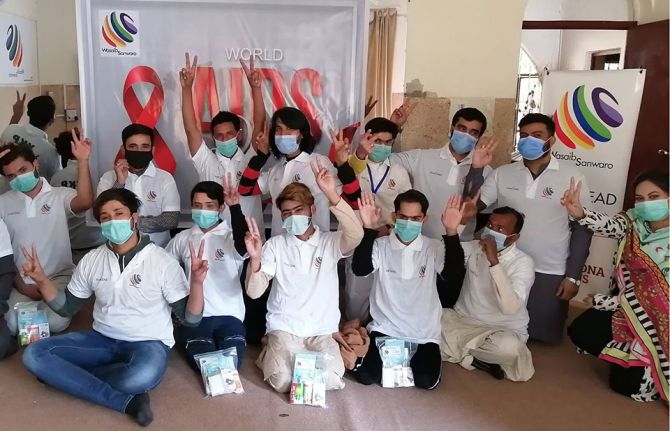
Feature Story
Making a mark on the COVID-19 pandemic: joint efforts to meet the needs of young key populations in Asia and the Pacific
10 February 2021
10 February 2021 10 February 2021Ralph Ivan Samson, the President of Y-PEER Pilipinas, and his team of young volunteers have been working tirelessly throughout the COVID-19 pandemic to supply antiretroviral therapy to young people struggling to get refills. “How could I sleep at night knowing that community members were depressed and anxious about their refills. I had young people texting me they were down to their last couple of pills,” said Mr Samson, remembering the initial COVID-19 outbreak in the Philippines in March 2020. It was at this moment that he knew he had to do something.
Throughout the region, civil society organizations like Y-PEER Pilipinas began looking into ways of overcoming the barriers and challenges that prevent young people from accessing HIV services due to COVID-19 restrictions. For example, Y-PEER gained support from local governments with special travel passes to enable the delivery of antiretroviral therapy from the hospital straight to the doorsteps of young people living with HIV.
Y-PEER Pilipinas was one of several beneficiaries of the COVID-19 Emergency Relief Fund, a regional small-grants programme established by Youth LEAD to support initiatives led by young people across Asia and the Pacific during the COVID-19 pandemic. The COVID-19 relief fund supported 12 organizations led by young people in nine countries with various projects, including the delivery of antiretroviral therapy, hygiene products, opioid substitution therapy, emergency supplies and food, cash transfer programmes for businesses run by transgender people and housing for key populations.
Youth LEAD’s efforts to mobilize resources during the early days of the pandemic are a testament to young people rising up to the occasion and working in coordination with regional partners of the HIV response in Asia and the Pacific. In their efforts to raise funds, Youth LEAD relied on the findings of a regional assessment on the needs of young key populations and young people living with HIV during the COVID-19 pandemic conducted by the Inter-Agency Task Team on Young Key Populations Asia Pacific (IATT on YKP), a regional coordinating platform comprised of United Nations agencies and young key populations regional networks. The results of this assessment helped to inform the IATT on YKP and its regional and national partners on ways to support organizations led by young key populations during the COVID-19 response. The evidence gathered through the survey was used to inform preparedness response plans and local strategies on providing timely information on COVID-19 prevention, supporting the delivery of antiretroviral therapy and tackling stigma and discrimination.
With the support received from Youth LEAD, Mr Samson and his team of volunteers provided condoms and lubricant and emergency supplies to young key populations and young people living with HIV across several provinces in the Philippines. The programme is known online as #GetCondomsPH, and a similar initiative led by young people from the COVID-19 Emergency Relief Fund supported the delivery of antiretroviral therapy to people’s doorsteps in Goa, India.
Aadi Baig, Programme Manager, and his team at Wasaib Sanwaro, an organization that works with gay men and other men who have sex with men and male sex workers in Pakistan, have also benefited from the COVID-19 Emergency Relief Fund. Mr Baig revealed a troubling picture of how the COVID-19 pandemic has made things worse for key populations. “The pandemic has created a greater divide among people, socially and economically, and has uncovered the lack of social security and protection programmes for key populations.”
With the support received, Wasaib Sanwaro donated food and supplies to key populations and provided basic HIV and COVID-19 training. Although there are limited funding schemes for organizations of young people across the region to access grants, regional networks of young people, such as Youth LEAD, Y-PEER and YVC, and the coordinated response by the IATT on YKP, which in 2020 was co-chaired by the UNAIDS Regional Support Team for Asia and the Pacific, the APCASO nongovernmental organization and the United Nations Development Programme, have stepped in to provide support.
As part of the work of the IATT on YKPs, a website that pools together COVID-19 resources for young key populations and showcases how young people have stepped up to respond to the COVID-19 pandemic was developed. The website also focuses on resources on the mental health of young key populations and the well-being of adolescents and young people at higher risk of HIV.
The most crucial aspect of all these activities was visibility, the visibility of young people, to ensure that young key populations and young people living with HIV had a voice during the pandemic. To keep the issues and needs of young key populations on the top of the advocacy agenda in the region, the IATT on YKP, with support from the UNAIDS Regional Support Team for Asia and the Pacific and Youth LEAD, held the first Spill the T with YKPs webinar—an online panel with young people from across the region that offered a platform for young people to talk about their initiatives and their roles in the COVID-19 response. The series continued through the collaboration of the IATT on YKP with partners and explored issues of young people’s leadership, mental health and sexual and reproductive health and rights.
Our work
Region/country
- Asia and Pacific
- Australia
- Bangladesh
- Bhutan
- Brunei Darussalam
- Cambodia
- China
- Democratic People's Republic of Korea
- Federated States of Micronesia
- Fiji
- India
- Indonesia
- Islamic Republic of Iran
- Japan
- Kiribati
- Lao People's Democratic Republic
- Malaysia
- Maldives
- Marshall Islands
- Mongolia
- Myanmar
- Nauru
- Nepal
- New Zealand
- Pakistan
- Palau
- Papua New Guinea
- Philippines
- Republic of Korea
- Singapore
- Solomon Islands
- Sri Lanka
- Thailand
- Timor-Leste
- Tonga
- Tuvalu
- Vanuatu
- Viet Nam
- Samoa

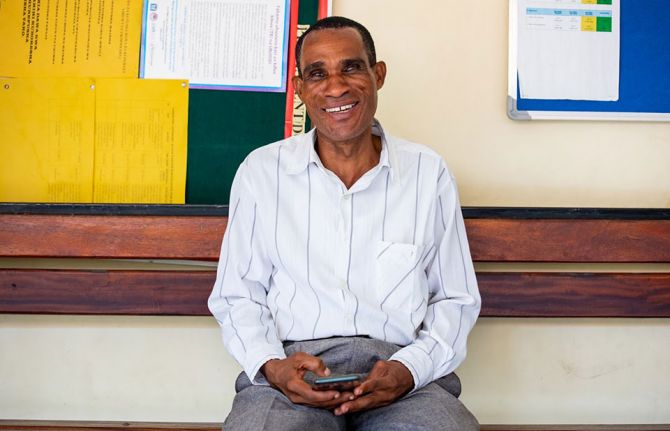
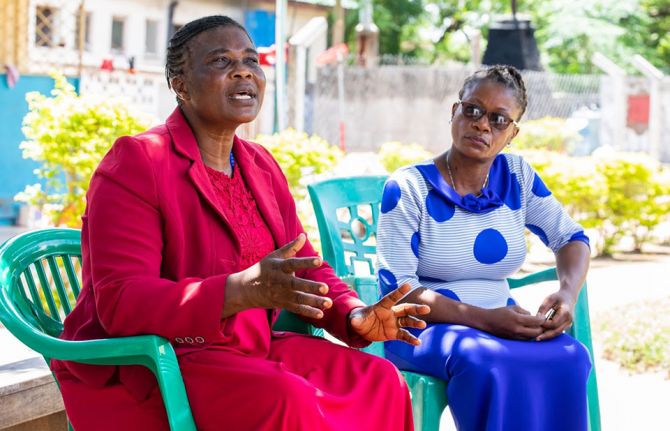
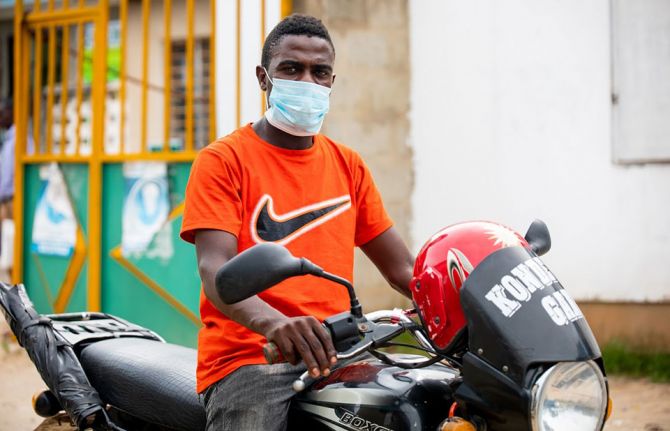
Feature Story
Coming together to address the cost of inequality
15 December 2020
15 December 2020 15 December 2020“My business suffered because of corona. Before corona, I would sell at least 10 egg trays a week. At the height of the pandemic, I was lucky if I could sell two trays,” lamented George Richard Mbogo, who is living with HIV, a father of two, and owns a chicken, egg and chips business in Temeke, a district in the southern part of Dar es Salaam, United Republic of Tanzania.
The COVID-19 crisis has adversely impacted the livelihoods of people living with HIV in the United Republic of Tanzania, exacerbating the challenges they face. These include HIV service delivery and widening social and economic inequalities.
“Corona has been a very difficult time. I lived with a lot of worry and stress. Driving a bodaboda (motorbike taxi) requires going into crowds and working closely with people. It has been difficult not to fall into anxiety and depression, balancing getting my HIV treatment and work. I had moments thinking of stopping taking my meds, but I didn’t,” said Aziz Lai, a motorcycle driver who also lives in Dar es Salaam.
Although the colliding pandemics of HIV and COVID-19 are hitting the poorest and the most vulnerable the hardest, through national resource mobilization the COVID-19 crisis has created an opportunity for partners to mobilize in support of the communities they serve.
The collaborative efforts between the government, development partners, including the United States President’s Emergency Plan for AIDS Relief, USAID and UNAIDS, the National Council of People Living with HIV (NACOPHA) and community activists have been key in responding to COVID-19, providing information, services, social protection and hope to people living with HIV during these unprecedented and trying times.
One such initiative is Hebu Tuyajenge, run by NACOPHA and funded by USAID, which focuses on increasing the utilization of HIV testing, treatment and family planning services among adolescents and people living with HIV, strengthening the capacity of community organizations and structures and improving the enabling environment for the HIV response through empowering people living with HIV.
Caroline Damiani is a single mother of three who is living with HIV and keeps chicken and ducks for a living. “Hebu Tuyajenge gave us personal protective equipment, sanitizers, soap and buckets and education about COVID-19 and how to take care of ourselves in order to stay healthy during the pandemic,” she said.
Through community-based services that supplement facility-based care, people living with HIV have been linked to and kept on treatment during the crisis by critical peer-to-peer HIV services.
For Elizabeth Vicent Sangu, who has been living with HIV for 26 years, her “numbers” speak for themselves.
“From my community follow-ups, I have returned 80 people to the clinic for CD4 count testing, inspired 240 people to get tests, reported 15 gender-based violence cases and provided education to 33 groups, including youth and church groups,” she said, beaming with pride.
NACOPHA helped Ms Sangu to come to terms with her status and helped her on her own journey of self-empowerment.
“Since becoming a treatment advocate for Hebu Tuyajenge, I have received help with entrepreneurship and education about HIV. I have become a teacher for others. I have made others brave about living with HIV and getting tested,” she said.
The partnership between community advocates and health facilities has paid off.
“Both we and our patients were fearful initially, but due to information and education, things got better. We focused on providing hourly and daily information to patients about corona and made sure that people practised safe social distancing,” said Rose Mwamtobe, a doctor at the Tambukareli Care and Treatment Centre in Temeke.
“Not only in the United Republic of Tanzania, but globally, COVID-19 is showing once again the cost of inequality. Global health, including the AIDS response, is interlinked with human rights, gender equality, social protection and economic growth,” said Leopold Zekeng, UNAIDS Country Director for the United Republic of Tanzania.
“The key to ending AIDS and COVID-19 is for all partners to come together, on a country and global level, to ensure that we leave no one behind,” he said.




